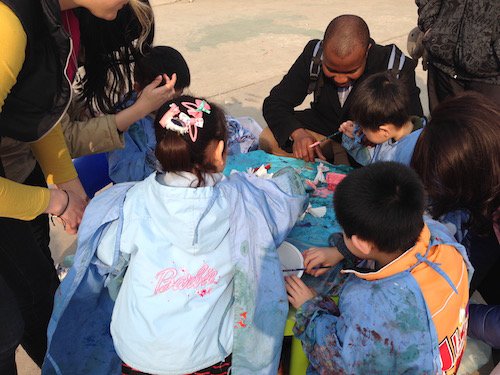The Bethel Diaries: Why Write About Volunteering?
Two weeks ago, I started volunteering for Bethel China, an organization that provides education and foster care for children who are blind and visually-impaired, with a focus on children without parents. Though this is my first time getting involved, I've been following the organization for many years.
I first heard about Bethel when I was assigned to write about children's charities for the December 2011 issue of beijingkids. Around two years ago, my oldest friend in Beijing – Anna Calsina, pictured above – became their development manager.
Through her, a few of us got the opportunity to visit the Doudian campus in March 2014. We toured the school and residences, then spent the afternoon making crafts with the kids; I was paired with a little girl called Ai Fei, who has since been adopted by a family in the US.

Rather naively, I was surprised that the kids could do art projects despite, well, not being able to see. Anna explained that not all people who are "blind" are completely blind; some have peripheral or tunnel vision, while others can read large print. Ai Fei fell into this category; she could easily follow instructions as long as someone showed her at very close range how to perform the task.
Over the course of the day, I saw children being children. The kids had tantrums, tried to sweet talk their teachers, and whined about having to put on their own shoes. They were also very sweet – laughing a lot, sharing with their peers, some of them asking for hugs or play time.
Two boys dragged us towards the dog while Ai Fei held my hand and stayed close; she gave him a few perfunctory pats, then dashed back to my side.

It was hard to get the kids out of my head after that visit. Though I didn't return to Doudian, I donated periodically to Bethel and recommended the organization to others. When I went freelance in June of this year, the idea of volunteering took up more space until I finally reached out to Anna.
During our initial meeting, I was surprised to hear that Bethel no longer encouraged one-time visits to Doudian. Anna explained that it was too difficult for the kids; having strangers come in for a day, never to come back was both confusing for them and of limited impact for the organization.

This got me thinking about how little I understand charity work. What are the most impactful ways to help organizations like Bethel? On a more basic level, what are the differences between a non-profit, a charity, a NGO, and a civil society organization?
When discussing the work of child-focused charities, not only is it not helpful to make the children objects of pity, but it can be downright harmful. Most of these kids come from difficult situations such as neglect or abandonment – so framing them as "those poor children" only serves to re-victimize them and overshadow their capabilities and value.
My goal for this blog series is to share with readers all the things that I'm learning about in my volunteering with Bethel so that we may all come to a better understanding of the nature of charity work. Topics might include misconceptions about blind and VI children, adoption in China, fundraising strategies, how grant writing works, and more.
Shameless Self-Promotion Corner!
This is the part where I plug Chi Fan For Charity, one of the biggest fundraising events of the year. Bethel is one of the recipients this year, along with the inspiring Educating Girls of Rural China (read our interview with Founder Tien Ching here).
The premise is simple; diners pay a set amount (RMB 500-1,000) for a great multiple-course meal at a Beijing restaurant hosted by a local personality. Participating restaurants include TRB, Duck de Chine, Great Leap, Slow Boat, Caravan, LA Palms, and more. Anna herself will be co-hosting a table at Velvet. See all of our Chi Fan For Charity coverage here before the big day on Saturday (Nov 7).
Tip of the Day
Most people aren't sure how to act around a child with VI. A basic piece of advice is not to do things for them; it might take them longer than a sighted child, but they'll figure it out.
If you want to guide them towards something, explain what they'll be touching; they can be afraid of new textures if they don't know what to expect. Ask them first if you may take their hand; children with VI see through their fingers and are usually protective of their hands.
This article first appeared on our sister site beijingkids.
Photos: Michael Connors and Sijia Chen







